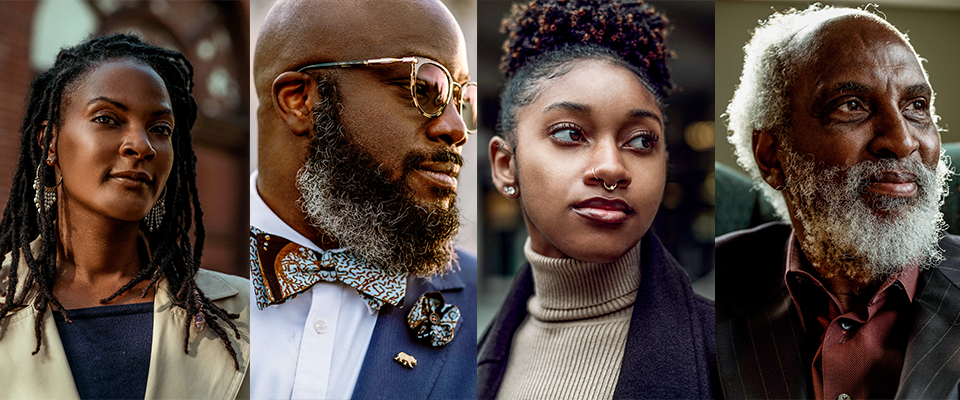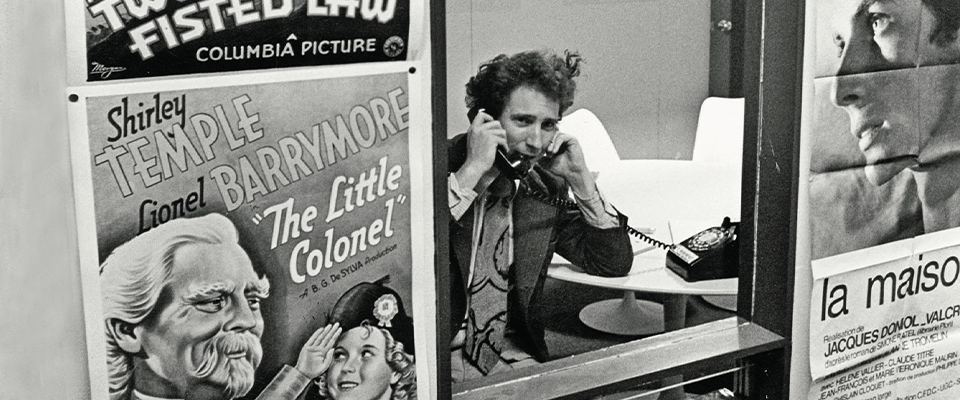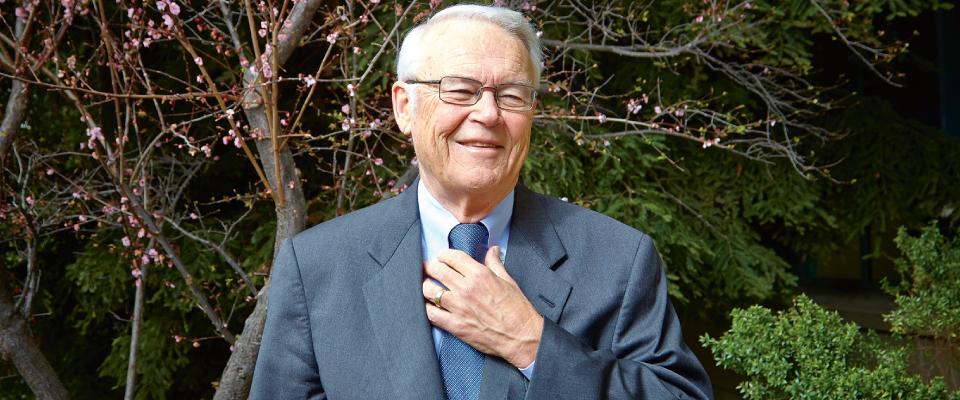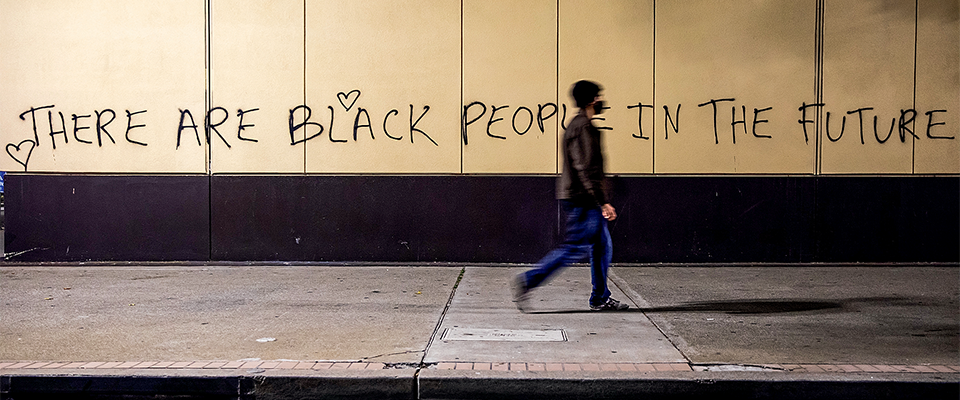Students, staff, and faculty discuss where we are and the way forward.
On Nov. 10, 2020, California magazine assembled a select panel of Black faculty, students, administrators, and alumni to discuss, via video conference, the question, “How do we make Black lives matter at Berkeley, and beyond?”
You can read a lightly edited version here or watch the full conversation on our YouTube channel.
TAKIYAH FRANKLIN: Before we get started, I’m going to take this moment to give a brief background on the trajectory of the struggles of Black and brown people at UC Berkeley. In 1968 there was a five-month strike that demanded a radical shift in admissions practices. And that was followed swiftly, in 1969, with a three-month strike that led to the creation of the Ethnic Studies department. Fast forward to 1999 and protests against financial cuts to that very department. The protest continued with rallies and sit-ins that led to a five-point agreement and the creation of a research center on campus now called the Center for Race and Gender.
Fast forward to 2014. Again we have Black students demanding space amid the Black Lives Matter movement, which resulted in the creation of the Fannie Lou Hamer Black Resource Center and the African American Initiative. Now, again, we’re seeing ongoing demands and fights to maintain and sustain those demands.
At the present moment, we have the protests and uprisings that erupted around the country in response to the killings of George Floyd, Breonna Taylor, Ahmaud Arbery, and many others who we are constantly having to name and keep present in our consciousness so that we can stay clear around why these struggles continue.
Where do we go from here at Berkeley? What do we make of the exhaustion, the sense of this never-ending struggle? How do we orient ourselves? What do we want Black students to know? What do we want all students to know when we talk about Black lives and what that means in the current socio-political context? I would love to open up the table, with reflections on our organizing question (and whether it’s even the right question), ‘How do we make Black lives matter at Berkeley, and beyond?’
And I would ask for reflections from Femi Ogundele and Takiyah Jackson first, considering that both of you are at very central points in the campus in terms of dealing with the day-to-day experiences of Black students.
TAKIYAH JACKSON: Before I think about what we need to do, I’m seeking clarification and understanding of why we have to answer that question. I think about the formation of the University in 1868. How did they envision it, and who did they envision it for? Obviously it wasn’t for us because we were not even allowed to be here, right?
I think back to the first group of Black students that entered in the 1920s, and my question is: what did the University do to prepare for those students? How did they envision creating belonging, or did they just say, ‘You’re here, so you have an equal opportunity to thrive’?

Ida Louise Jackson, who was a leader just like most of our Black students today, was the first to create her sorority on the West Coast and raised a lot of money to be in the UC Berkeley yearbook at the time, only to have the chancellor say, ‘We don’t want you in our yearbook. We’re not going to include you because you don’t represent what we consider our student body.’
Why is it that Black students had to demand better for themselves? The first time that I know of them doing it specifically for Black students was in 1989, when the students demanded that they have their own director. African American Student Development was born out of those demands, and then all the other multicultural offices were born out of that.
Why wasn’t everyone pushing for this? We had student climate surveys; we knew what the Black experience was. It wasn’t a surprise that it wasn’t good. I think it’s part of the challenge that it’s not a ‘we’ thing, it’s not everyone saying this is unacceptable for our peers and fellow students. It’s just us saying this is not right for us. We’re allowed to get our education here, but we’re not allowed to thrive like everyone else.
What’s also really telling is you can look at a student that went to UC Berkeley in 1920, in 1960, in 1989, and 2020, and they will have had very similar experiences.
What I’ve seen is a lot of supplementing and very little transformation. It’s like: ‘Here’s something to appease you. We gave you a director, so that should change your experience. Now you have a center; you shouldn’t have anything to complain about.’ But the culture is not being transformed. In fact, it’s barely being touched. So how can we expect different results?
So when I think about Black lives mattering, it’s like, to who? And who is going to fight for what we need for Black lives to matter to everyone? Because of course it matters, because we fight for it. But in my experience, students spend most of their time fighting for Black lives and do not get to spend as much time on their education or extra opportunities. The labor is on the backs of the students. And that’s what I would like to see change. I would like Black students to leave not having labored the whole time to transform the University. Also, I would like them to leave and be prideful of being a UC Berkeley graduate, not just a Black community member but a UC Berkeley graduate.
FEMI OGUNDELE: To pick up where Takiyah’s leaving off, there’s no doubt in my mind that there is a coalition of people on this campus that absolutely care about the Black lives and the Black experiences that students have, and they’ve been here for quite some time. But they are not in the majority. And so when we talk about ‘How do we make Black lives matter,’ I think the big question is, who is the ‘we’ that we are trying to get these Black lives to matter to?

And that requires us to take a hard look at ourselves as an institution. I think that one of the things that’s always challenging when it comes to combating the historical references, or the frameworks of Black bodies and experiences, is that it really goes in one of two directions: either Black experiences or bodies are demonized or they’re erased from history. And I think those two tactics are incredibly effective in not allowing folks to understand just how far along in the relay race they might actually be. Because there’s been an erasure of institutional memory, students find themselves fighting the same fight they fought in 1989, in 2009, and in 2019.
Admissions plays a role, I think, in an institutional identity because its job is really to tell the narrative of an institution to the public. And, because there’s so much to draw from, we can decide the narrative we want to construct. It’s not just going out there and trying to get in front of diverse communities but really thinking about the audiences we are putting ourselves in front of and asking what are the important pieces of our history that will matter to them.
There’s a lot of work that we can continue to do in admissions, starting off with recognizing our data, not just from a quantitative perspective, but a qualitative perspective. We can say, for example, a great percentage of the students we invite to Cal Day actually decide to enroll. Is that the case for the Black students who come to Cal Day? Is that the case for the Latinx students who come to Cal Day? And if we don’t know that information, we don’t know if we’re being effective to those communities.
But, to Takiyah Jackson’s point, if diversity or equity is something that is additive or ad hoc, then the moment that the budget starts to dry up, the personnel gets low and the decisions get tough. Those things are compromised. If we are really thinking about how we can not just supplement but truly transform, then it does require us to center our work around some of the most disenfranchised populations that are out there. And if we start there and actually do the hard work, there’s no doubt in my mind that all of the boats will rise, that everyone will benefit.
TAKIYAH FRANKLIN: Dean Carter, I’d like to invite you to share some of your reflections on this question and offer your insights as a dean. When students come to this campus, what are some of the structures that are either helping or hindering their experience?
PRUDENCE CARTER: First, I want to say that, although it is insufficient, representation matters. This is the first time I’ve been in a selective institution where the numbers have been this small when it comes to Black lives and Black bodies. Femi has done an extraordinary job as the director of admissions to increase this year’s class, but when I arrived here the Black undergraduate student population was at two and a half percent. The faculty numbers are similar. Visibility matters. Representation matters. It does. It’s the first step.

But I don’t think this institution can be divorced from what’s happening outside of its walls. Many of our faculty members, many of our students, many of us have grown up in segregated neighborhoods. What are the opportunities or the conduits through which we can actually change the habits, hearts, and minds of those 70 million plus people in our country who still would vote for someone who is an avowedly and unapologetic racist?
And many of those people, if you survey them, will probably say they think racism is bad, that anti-Blackness is bad. But what happens when it comes to their actual behaviors? The self-interests prevail. And so I’m trying to figure out how we actually get to a stronger cultural movement. No policies, no mandates can actually change people’s mindsets. There has to be more of a spiritual movement.
We can try to make people do things by policy, but then there’s a decoupling for how well it gets implemented. And I think that’s what the University has actually struggled with. The implementation tends to be anemic because the hearts and the habits are not changed. I think it’s a vexing problem for us to consider as we try to move forward.
TAKIYAH FRANKLIN: I’d love to hear from Kyndall and Caleb, the undergraduate and graduate students, to reflect on your experiences and all that’s been said so far.
KYNDALL DOWELL: The reality for a lot of Black students is they don’t get to be students. Some faculty say your sole purpose at Cal is to be a student first, but being a Black student at Cal, I don’t think that we’re allotted the privilege to just solely exist in spaces. Being at the University has always been a struggle. You know, I have disabilities, I’m low-income, and I’m first-gen. All these different layers have affected how I enter the classroom and how I’m received in the classroom. I’ve experienced microaggressions and all kinds of discrimination in my courses—and failed classes, even—over needing to be accommodated or simply recognized, or afforded an opportunity, or just access.
I came to Cal understanding that it would be this liberal mecca and the expectation that I would be accepted here and that this is where I can openly and freely exist—only to get here and realize that’s not necessarily true, or hasn’t been true for me.
And so I did spend a lot of my time doing community work, organizing, traveling to other campuses every other weekend and working with other Black students because it’s a widespread issue within the whole UC system. I think a lot about what needs to happen because me and my peers are tired.

CALEB DAWSON: A lot of things Black undergraduates experience around microaggressions, around feeling unwelcome, or like they’re entering into hostile environments where they can’t fully show up as themselves, that’s something that many Black graduate students also experience. And it goes beyond students to the staff experience at Cal and the Black faculty experience at Cal, and for me these things are connected.
It’s really alarming to see the ways that some Black faculty don’t feel like Berkeley is a place that they want to be, as much as they want to be here for us and show up in the space and support us doing great work. You know, seeing some of our role models and people we really admire not feel like the place is hospitable to them sends signals to us too.
I think we’ve got to think about the entire ecology of the campus, so it’s not these isolated spaces that might feel like some Black folk can fit into. Because Black folk are also really diverse, and so we need to think about how we can make an entire campus a place where a variety of Black folks can show up and feel like their lives, their interests, their desires, their needs are being prioritized.
I’ve noticed that not only Black undergrads but also grad students do a lot of work to make the campus more hospitable, to make it survivable. In addition to Black folk being demonized, I think Black folk are also giving away too much work, including our Black faculty who are called upon to play numerous roles in diversity issues and problem-solving—a lot of times without the credit that they need.
TAKIYAH FRANKLIN: Thank you, Caleb. I would love to rope in Professor Hood and Professor powell, particularly in thinking about what art can do to facilitate some transformation and change that can make Cal less of a traumatic experience for some, and less of a struggle. What role does art play in that? And Professor powell, I’m thinking about your work on radical belonging as a response. Can you give us some insight on how to think about belonging as a way of being?
WALTER HOOD: I was a student at Cal in the ’80s, and I feel, Kyndall and Caleb, everything you said. Nothing’s quite changed.
I came to Berkeley thinking it was going to be a different place. I came from the East Coast. And what I’ve learned over the 30 years of being here is that UC Berkeley is a reflection of the U.S. I thought I was in this bubble out here for a while at countercultural Berkeley, where I could stop ironing my shirt, I could be whatever I wanted to be. Until it hit me … a couple times. As an assistant professor, I came to school on a football day, showed them my ID card, and they thought I was joking. I walked through campus, people asked me, ‘What are you doing here?’
So these things still come up, and seeing this litany from ’68 to ’69 to ’99, and we can keep going … This is America. But when you’re inside the academy, there’s a different, liberal way of talking, and I first noticed it when I had to move to Oakland, and all my colleagues had to move to Berkeley. It became that clear. They don’t come to Oakland to visit. In 25 years, they don’t come to Oakland to visit.

I make art. I teach these subjects, but I find that I have more power outside the University. And that scares me, that I get more power outside of the University because there are more diverse voices in different places that can collect and actually do work.
I do think art has the ability, though, to move away from the objective and become more speculative. The work that I’d like to engage more in is really thinking about speculative futures for Black communities. How do we dream about our future? And the hard and scary part is even we can’t see a future.
Sometimes art can give us a window where we can see ourselves, not in reality but in a profound, more speculative way.
And so I try to do that every semester with my students, and in my work, but I’ve kind of given up on the public university as this kind of beacon that is pushing against the world. I used to hate to even think about going to Harvard or Yale or Princeton, but they have the resources to do things.
Kyndall, one last thing: You said you don’t get to be a student. A lot of faculty don’t get to be faculty. And that’s really, really sad.
JOHN POWELL: These are really complex, layered questions, and we can’t address them adequately in the amount of time we have, but I just want to lift up some things and maybe complicate things a little bit.
You know, when you’re driving around and you see a sign saying this is a drug-free neighborhood, you say, ‘Okay, they have a drug problem.’ They don’t have those signs where they don’t have a drug problem. In a similar way, when we talk about Black Lives Matter, we say that because there’s so many expressions in our society that Black lives do not matter.
We can certainly talk about the police. We could talk about George Floyd and Ahmaud Arbery. That’s a graphic expression of Black lives taken because of their Blackness, apparently. Why do I say ‘apparently’? Well, really their lives are not being taken because of their Blackness, their lives have been taken because of whiteness.
The heart of the problem in this is not about Blackness. It’s whiteness. It’s white supremacy. So how do you have a place where Black lives can matter, in a society that in many respects is organized around white dominance and white supremacy?

So even as we think about, like, can we have our corner? Can we have our office? As a prophylactic that may be the best we can do. But ultimately, the challenge is to understand and dismantle white dominance and white supremacy. And so when we study African American studies, when we study ethnic studies, that’s important. But really what we’re talking about is white studies, which is the rest of the campus. But they don’t call it that. They just call it ‘studies’. They just call it ‘the curriculum.’
I’ve worked with a lot of big companies, and they say we need to go to historically Black colleges and find Black students. Great. I support that as well. In many historically Black colleges their percentage of white students is higher than the percentage of Black students going to Berkeley, Stanford, or Yale—which is to say, historically white colleges. But we don’t call them that.
When you say to students, you need to take an African American or ethnic studies course, they’re like; ‘What does that have to do with my education? My education’—they don’t say this, but—‘my education is really understanding, reproducing, and embracing white dominance.’
Someone said, ‘Who discovered water?’ And the answer is, ‘I don’t know, but I’ll bet you it was not a fish.’ White people, they’re not going to discover the reaches of white dominance.
Years ago, after visiting South Africa, Brazil, and some other places, we were talking about affirmative action. I said, really, we should call it transformative action, not affirmative action, because affirmative action is based on the notion that the system, the structure, is basically good, fair, and we need to add some people who are left out.
I have this analogy that if you get on a train that is going from one broken system to another broken system and the passengers on the train are all upper middle class, older, straight white men, we can say, ‘Okay, let’s get some Black people on the train, let’s get some Native people on the train, let’s get some gay people.’ I support that. But the train is still going from point A to point B.
We’ve changed representation, but we haven’t changed the destination. And transformation is an expression of belonging. Let’s have a discussion about where we’re going.
Jefferson’s idea of education—that famous slave holder—was that education would help make us into citizens, and his idea of citizenship was that you have the ability to take the other person’s perspective. In a white-dominant society, white people can’t take Black people’s perspectives, so they don’t understand why Black people are upset about being killed by the police. Which means, from our perspective, we’re not educating.

The power structure of the university has to be rethought and it has to be about belonging, which means you’re not joining, you’re not being included, you’re co-creating the thing you’re joining. That’s the larger mission that we have to embrace if we actually want to make Black lives matter.
PRUDENCE CARTER: I love that term, ‘transformative action.’ I’ve been trying to figure out how we could actually reclaim our time from the misuse and abuse of affirmative action. So perhaps it’s just a reframing. I don’t believe that we’re going to really radically change the institution without shared power. For me, the bottom line is shared power—that is material, economic, that is in leadership, in terms of representation of students and faculty at every level in every field on this campus. It’s the sharing of power across the dimensions.
FEMI OGUNDELE: I would simply just say it’s going to require us, as an institution, to really pay attention to what is happening in the Black community and our ability to influence it. Too often we believe that the demographic shifting is something that’s happening to us rather than something that we can actively partake in and actively engage in, in a way that shows our responsibility to serve this changing demographic and this changing public. And while incremental progress is important, I think we do need some radical change. I think we need some radical thought to go with that, and we shouldn’t be afraid of leaning into some of that.
I think it’s important that we recognize that what we build is just as important as what we dismantle, and one does not need to happen before the other. And so we can absolutely be building and dismantling at the same time. I’m always using the analogy of renovating your house. If you want to renovate your kitchen, the first part is demolition. Right? And so it’s always important to think about what systems and structures we need to dismantle in order to build at the same time. Not to say that we should completely tear it down and be lost. But we do have an opportunity to build and tear down at the same time, and I think we need to be thoughtful about that. And I think, to Dean Carter’s point, we need to think about that in every facet of the work that we do: representation, messaging, what do we incentivize, what do we value?
TAKIYAH JACKSON: I was also thinking, Femi, about like, as we demo and as we create a new blueprint, who is represented at the table to say how it’s built? Because if it’s the same people, then it will be built the same. Right? And so I think it’s really important that we are cocreators in the rebuilding.
The other piece, I think that we have to get to—because no one’s figured it out, and it’s the only way that we’re going to get there—is to deal with whiteness, as Professor powell said. We know that white students can come into the University with the ideas that they had and probably leave with the same ideas—that they will be untouched and unchanged, because there’s nothing in place to say, ‘this is how we want to change hearts and minds.’ And so I think that until we deal with that, the Black experience for students, staff, faculty will not change because the culture and the climate will remain the same. And as much as representation matters, as much as space matters, as much as resources matter, I think that sometimes can be seen as people doing us a favor. But, really, we need to start thinking of it as justice.

CALEB DAWSON: A point of reference for me is the Black campus during the ’60s and ’70s. The Black Power movement was on campuses. There was a push for these campuses to be Black campuses and serving the Black community. And so I wonder, can Berkeley not only be serving those on the campus but can Berkeley be serving the Black community beyond? I’m not interested in Berkeley having these clear, very strict social boundaries where we’re interested in Black people who are members of campus, but if you’re not a member of campus, we have no ethical obligation to treat you with dignity or respect or to value or to prioritize your needs and well-being. If all Black lives matter, we need to dissolve this boundary.
But I don’t think that we can prioritize Black life and not disrupt the exclusive hold on economic, social, and political power that other folks have enjoyed.
KYNDALL DOWELL: I think about an experience that I had this past summer. I had the opportunity to take this course—it was Education 190, a course in critical pedagogy—and I absolutely loved it. That was the first time in my experience at Cal that I felt safe in a classroom. It was a very healing experience to take that course. And I have been reflecting a lot on what the difference was between my other courses or past experiences. And with this course I think the difference was a recognition of my humanity, with my instructor being so deeply accommodating and just taking the personal responsibility to meet me halfway or to see me fully.
JOHN POWELL: Kyndall, In terms of what you just shared, we, … from my perspective, we don’t want structures that don’t discriminate or structures that even accommodate, we want structures that actually lift up and engage.
We shouldn’t be thinking about a structure that accommodates here, we should be thinking about designing a structure of reflection. And so we have to be more affirmative. How do we design structures to do the work we want them to do? We don’t build a house and then say, ‘Oh, yeah, we need to add a ramp.’ No, you build a house recognizing the community it’s serving, and the house is designed from the very beginning to reflect that. And the people are participating in the design.
So, to me, that’s where belonging takes us; it takes us beyond inclusion and accommodation. In the ’90s, we used to talk about tolerance. It’s like, really? We’re going to tolerate Black people. Really?
TAKIYAH FRANKLIN: It sounds like we need a new institution inside the institution. Can we get an HBCU at Berkeley?
PRUDENCE CARTER: But I don’t think that we want to necessarily essentialize Blackness either, because there are some Black people who were willing to put the Trump administration back into power. I mean 13 percent is a significant percentage. We’re diverse. We need to think about our own ideological diversity because white supremacy is not just for white folks. Anti-Blackness is not just for white folks. Or other people of color. And it’s important for us to understand how we have internalized some of that too. So we want pro-Black institutions and organizations, but that doesn’t mean that the people necessarily have to be Black. I mean, they can be allies.
TAKIYAH FRANKLIN: Absolutely. I agree with that wholeheartedly. That’s going to be the next conversation.
Well, thank you all so much for being present and sharing your brilliance. I’m hoping that we can continue to have these kinds of dialogues and start to move toward implementing these visions. And I will continue to hold this idea of cocreation, right? Like, in order to transform power structures there’s something about being really radical about the power that we have within us and the spaces that we can influence when we step into any room. And so that’s the work to do, continuing to unlock that power and to know that it’s ours. And we gon’ be alright, like Kendrick Lamar says.
PRUDENCE CARTER: We gon’ be alright.
From the Winter 2020 issue of California.





















